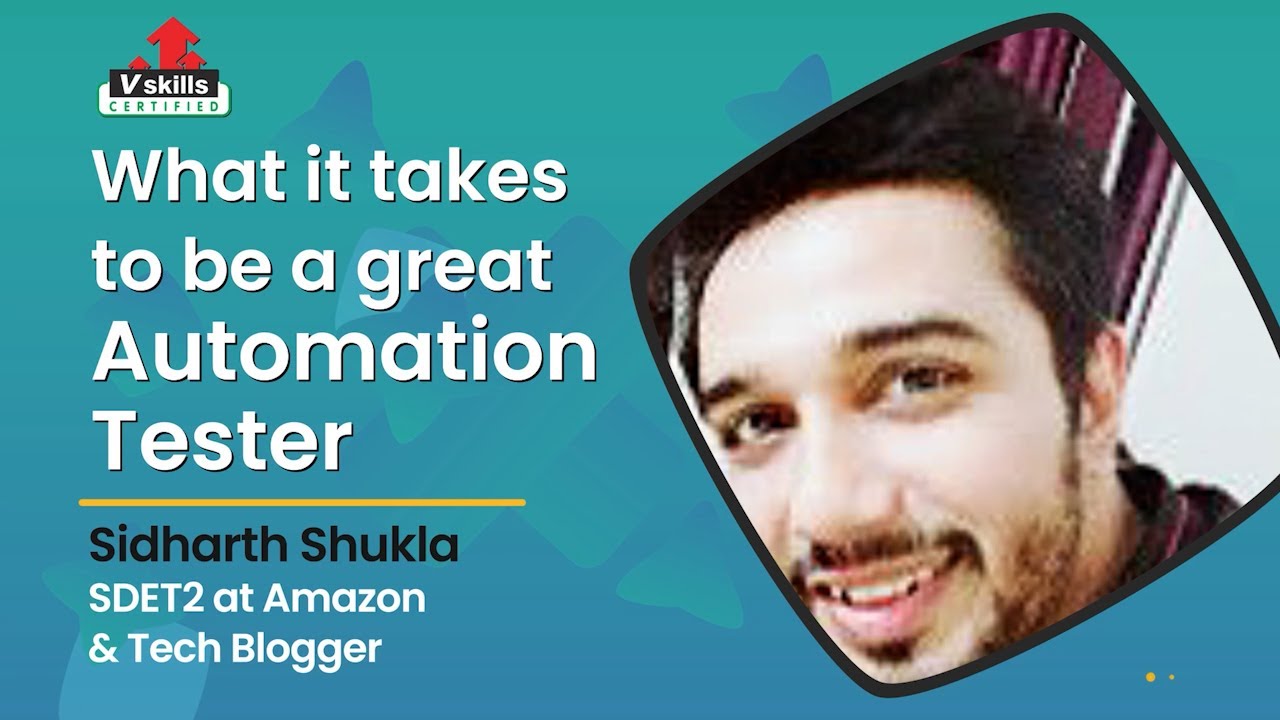Today we have with us, Mr. Sidharth Shukla. He has over 9 years of working experience in Automation Testing and Software Engineering. Sidharth is currently working with Amazon as SDET2. He has an extensive experience in Automation testing with a good understanding of tools like QTP/UFT, Selenium Webdriver with Java, TestNG, and many more. Along with that, he has worked in Senior capacities with companies like Capgemini, Xoriant, and GS Lab. He is also the Founder and Author of Automation Reinvented writing about Testing Frameworks and Automation Tools.
1. Can you share more about your journey and how did you develop an interest in this field?
Answer: I started working in different fields. I started working with _. By that time I felt, it was not my area of interest and not exciting for me. So by the time, I started exploring automation and as far as I remember, selenium was not there in the market much. I began with QTP at that time and slowly when I worked with previous scripting, I thought I can do better with the scripting of programming. So I thought of moving to a new programming language.
Then I started learning java. Once I completed learning java, then I moved to selenium. So it’s not like I moved from selenium to java, I learned java first and then moved to selenium from QTP. During that phase, I found a lot of things can be done during this phase, like working in multiple frameworks that aren’t constrained by programming languages. It’s not like you know java and can’t start working for the python framework. It’s kind of easy to move from one language to another.
By the end of 9-10 years, I can say, I worked in python, java, and javascript. You will get exposure in this field. But in development, you won’t get it always. But yes, they are also aware of multiple languages. What I found interesting at the start of my career is any language I pick, there is some kind of automation framework in that language that can be used.
2. How difficult or easy was it to crack the interview at Amazon and What was your preparation strategy?
Answer: First of all, I would like to tell that cracking amazon or any company’s not achievement is not a big deep actually frankly speaking. If you keep on doing what you are doing, you should always try to excel in that. It doesn’t matter in which company you are working. But yes when I joined amazon, I came to know there are a lot of things to be explored more. But I cannot say I didn’t get exposure before, because I worked with some very nice startups and companies also, and there I got a lot of exposure.
How I prepared for it actually there was nothing specific in my mind to join amazon but definitely, we all know right that this is a big thing. I never prepared for it though. I started writing jobs and then I started teaching people by taking weekend sessions. During that sessions, my fundamentals were a little bit was _, but when I started taking it got more clear for me. People used to ask doubts, I explored more so I can save that phase exactly made me a better programmer I can say because I was taking testing automation sessions so java, genkings, I started exploring more on them.
When you want to be strong in some subjects, start teaching somebody or start taking free sessions. And in 1-2 free sessions, you’ll be a master. And after that, it will be easy for you. It is suitable for your own career growth and apart from that you are helping the community also.
3. As we see you have done a lot of certifications from Microsoft, ISTQB, HIPAA, Lean Six Sigma. So how important are these for a professional to build their professional skills?
Answer: Most of the certifications I have when I was in __ and at the time the manager I was working with was also quite supportive and asked us to do certifications, so I started doing that. But in the long run, Microsoft I have done because during covid they were providing free learning sessions so I took that session and _____in fact during that phase. But as far as I think, if any certification is required as a tester, I would suggest ISTQB. Not just to have but good to have. I would suggest going for oral java certification that will make you a better java programmer.
Because at the end of the day, I feel, testing is an important attribute to learn but the main deciding factor is how you are doing it. Learn everything properly and concepts are clear, then if it’s not difficult for you to switch or change also. Maybe today I am working in the testing field, and tomorrow I would want to develop DevOps, that would be easy for me. Because I know my concepts are clear and know how things work. So I also changed the domain or technology, it won’t be a difficult task for me.
I would suggest going for ISTQB, then try for java certification. Because anyway if you will grab the certification, you will do a lot of things and turn out to be helpful.
4. How do you keep yourself updated about the latest automation trends and applications?
Answer: My main source is LinkedIn, as I spend more time on Linkedin than Facebook or Instagram and got a good amount of followers too, as I kept posting. During the nighttime, I used to read 2-3 blogs mostly every day on my mobile. And those blogs I specifically prepare from LinkedIn as it has a good community. When you learn about 3-4 things from blogs it will be very easy for you to write in my _ also and improve your career also.
Apart from that I have a couple of groups on FB, and Linkedin, in these people use to post their own writings. So that is also a good source for me. I use to go through them on Saturday and Sunday. That is the main source I can say.
5. What are the 5 most important skills to be successful in the field of Automation Testing?
Answer: First thing is you should be excellent in one programming language, be it java, python, or javascript, it doesn’t matter. You should be clear with the concept, you don’t need to go with data structure, algorithm, etc. as in automation you won’t always be needing to work in that kind of things. So stick to the basics, and clear your concepts. You should stress the fact that clearing concepts doesn’t mean watching youtube, rather try explaining those things to somebody else.
If he/she is able to understand, especially a fresher, then you are pretty much sure you are clear with the concept. As you could explain it to somebody who wasn’t aware of it. So that is the first thing, always stick to one programming language and learn it from concept, i would prefer java. As if you learn java, python and java script will be much easier. The second thing I would prefer is CICD. Because any CICD tool you pick, learn one. Unless your automation suit is part of your pipeline, it’s of no use.
Because nobody is going to make real use of your automation tool. And nobody will understand what impact it is making unless it is part of your development pipeline. Third, you should be very good in any containerization. Because going forward, there will be no test education without using parallel containers. Because along with a lot of testing, there will be a lot of test cases. When there are a lot of test cases, executing them in sequence will be time-consuming. Slowly, people will release that doing it parallel was better.
I am asking to learn local containers, to be thorough with concepts. So that in future you will come up with an idea how to run your suit parallel, which is very important to save your time. It will help you decide how stable your automation is, if running it quickly. Fourth is, trying to explore the integration testing part of the tester. We should not always focus on functional testing and system testing. Try to focus on integration.
If you understand the integration testing, you are understanding the real flow of the code. And if you don’t understand the code, in long run it will be difficult for you to automate. As maybe you are focusing on automating something, it is difficult and time-consuming but not important. And the last one is try to explore any cloud technology. It’s not mandatory but tries to explore because you are using a container, and your container may be in some cloud instance.
In the future maybe some of the tools won’t be seen, that’s why I didn’t mention any tools in 5 things. Because tools will come and go. We cannot say I have 10 years of experience in QTP, and Selenium, how does it matter if I am going to use them side by side. So never stick to any tool. Learning tools will take more than 5 days, it is very easy, if you know the concept, language, it is very easy. Because everything is written in their help doc. So yes, the last one is cloud. Try to explore any, AWS, or Microsoft.
Exploring AWS will give you a broader perspective of how things work behind the scene. Maybe someday you will design your own parallel execution setup using the instances. These 5 would be significant.
6. What advice would you give to freshers seeking a career in this field?
Answer: I would suggest that rather than focusing on development and testing, focus on one programming language. Try to clear your concepts, and never try to learn java___ but you ask them the collection, they are unable to answer. Stick to the basics, and I would suggest if you got planning that I will learn this language for 6 months, spend 6 months on it. Make a habit of writing at least 3-4, at least 5 programming in a weak. If you are able to do it for 6 months, in 2 months you will learn selenium, APM, and everything. So 6 months spent in programming, be strong in that then start picking tools.
Apart from that don’t target development or testing at the start of your career, but yes if you targeting, learn a programming language then come to the testing field. Because that would make you different, don’t go with the crowd. Be a good programmer as a developer, but work as a tester, to be always on top of your field.
7. What is the quotation you live by your life?
Answer: I love to learn new things. I would say that wisdom will never come by just by spending time in doing something. You have to learn new things continuously. The more you learn, the more you explore things, it will help you gain wisdom. In the long run, also, we feel like, I have learned python 2 years ago, but for the last 2 years, I am not using it. So don’t keep it untouched. I have kept it touched at the start of my career that this is of no use why will I learn.
If there is nothing to learn, pick any book any_. There are many _ resources, you will fund them on my LinkedIn or in my blogs. Just go and randomly start reading. Because you don’t know which one will help in the future. So I am of the opinion to learn something new every day, so that if something goes wrong, you don’t have to create the habit of learning, as it is already there. If you lose your job or anything would happen, you should not panic. You have the habit of learning, you know, this is the path. Just a little bit more effort and you will get a job immediately. So that is the thing I always follow.




